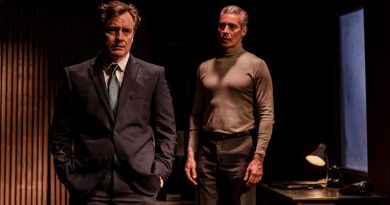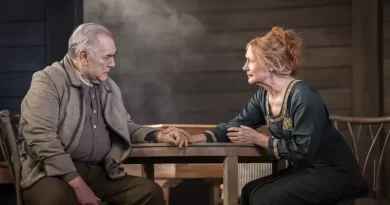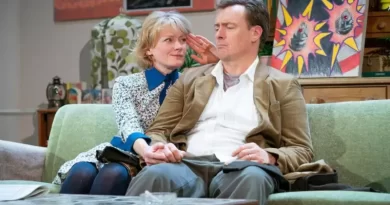“Boys from the Blackstuff” at the National Theatre’s Olivier Theatre
Jane Edwardes on the South Bank
4 June 2024
There’s a watery theme developing at the National Theatre. In London Tide, the Thames flows across the front of the Lyttelton stage, providing work for Victorian scavengers. While in the Olivier, where Boys from the Blackstuff is playing, a vast video, covering the back of the stage, shows the River Mersey lapping against the walls of the port of Liverpool. Hordes of dockers worked there until the 1970s, when the arrival of containers decimated the number of men needed to unload a decreasing number of ships, which led to the city’s decline. Factories were shutting down, too, as the country’s deindustrialization gathered pace.

The ensemble.
Photo credit: Alastair Muir.
This was the background to Alan Bleasdale’s celebrated 1982 TV series, which explored the bruising fate of Liverpool’s unemployed. With close to three million people out of work nationally, Mrs Thatcher pronounced that she was profoundly concerned about unemployment. But her concern didn’t help those Liverpudlians who were desperate to find jobs and who struggled to feed their families on the miserly benefits to which they were entitled. There may be plenty of work to be had today, but wages can fall short of what is required. Bleasdale’s characters are figures from a very masculine past, but we can still feel for them and recognize what we share in common.
It must have been a difficult task to compress a TV series into a single stage play, and for all the intelligence and integrity of James Graham’s adaptation, he doesn’t quite bring it off.
The scenes are short, and Kate Wasserberg’s production struggles initially to gain momentum, stuttering in the first half as container boxes are endlessly shifted around the stage.
Amy Jane Cook’s rusty, corrugated iron set with two great cranes at either side of the stage creates an impressive background as we follow the misfortunes of Loggo, Chrissie, Dixie, George, and Yosser. They regularly report to the Department of Employment, where they face an onslaught of identical questions, while also secretly working off the books on a local building site. The “blackstuff” is the tarmac that several of them used to lay until they lost all their money in a misadventure in Middlesbrough. Wasserberg’s staging of the work they do is neither sufficiently stylized to spark the imagination, nor sufficiently realistic to be convincing.
Inevitably, Yosser dominates. Anyone who saw the series will remember the late Bernard Hill’s magnificent performance as the troubled Yosser, whose repeated demand to “Gizza job” became an iconic phrase and was even adopted by football supporters at Anfield. The role both made Hill and cast a long shadow over his career. In the same part, Barry Sloane has a powerful presence, his anxieties and anger soaring as he struggles to deal with both bailiffs and bureaucracy. The children he awkwardly shepherds around from building site to confessional are actually figments of his imagination – something we don’t realize until someone points out that they were taken into care a while ago.
Yosser visits both of Liverpool’s cathedrals in search of succour. Given the way in which the church criticized Thatcherism, to such an extent that it could no longer be described as the Conservative Party at prayer, it seems a little unfair that both Catholic priest and Anglican reverend are figures of fun.
The play comes to life when the characters are allowed to breathe, especially Philip Whitchurch’s George, a kindly, older man, who dwells too much in the past but who also believes in the power of the community to fight back against injustice. People come to him when they need comfort and advice. It is another indictment of the church when the priest at George’s funeral isn’t aware that such a generous and well-loved man has always been known as George and not by the name on his birth certificate.
Chrissie (Nathan McMullen) also makes his mark, the antithesis of Yosser, who struggles to stay calm despite all that life throws at him. That makes it even more painful when he and his wife Angie (Lauren O’Neil) have a violent row over a job that he doesn’t feel that he can accept. He wants to hang on to his integrity; she wants to feed her children. As they exchange blows, you feel for both of them. It is demeaning to have to give your children stale bread to eat, as it is to shoot your pet birds because you can’t afford to feed them. Sadly, there is nothing dated about a lack of money for food.
It is not all grim. Yosser’s off-the-wall comments often raise a laugh. And Freda (Helen Carter), another of the wives, comically tries to keep visitors at bay at both front and back doors, as she hides from potential snoopers.
Even if they are working illegally, these men are not shysters. They take pride in doing a good job, especially Snowy (George Caple), who extols the art of plastering, while excoriating shoddy work. They want the pride and self-respect that comes from having a job. They want to be able to support their families. The power of Bleasdale’s original and Graham’s adaptation is that they show good men trapped, trying and failing to find a way out.
Having premiered at Liverpool’s Royal Court Theatre last year, Boys from the Blackstuff returned there this spring before transferring to the National Theatre until 8 June, followed by a run at the Garrick Theatre in the West End until 3 August.









